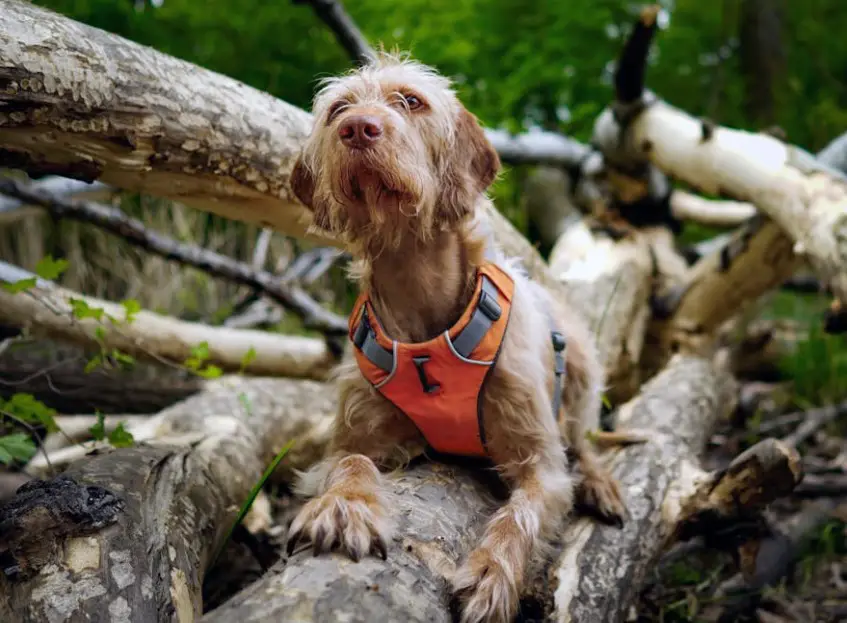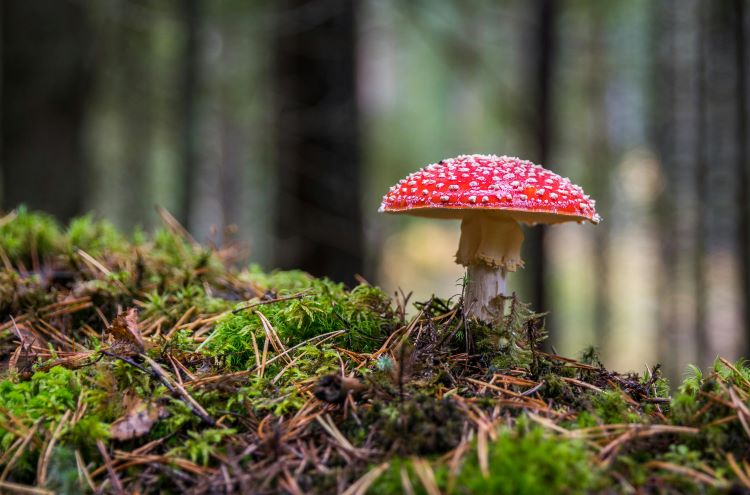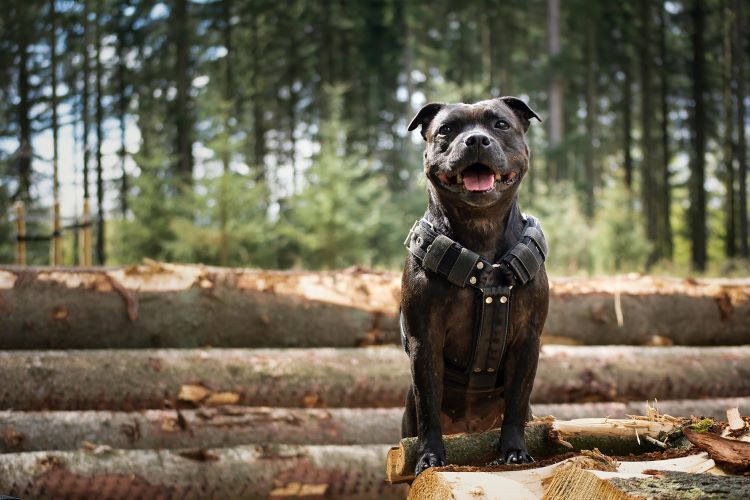Ready to help treat your pet to a healthy life?
What is Mushroom Toxicity in Dogs? Treatment & Prevention Tips
By : Kelli Rascoe & Trupanion Staff | Updated Sep 24, 2024

Dogs aren’t exactly known for their culinary reluctance. As all too many pet owners find out every year, this can lead to some dangerous consequences. Just look at mushrooms, for example. While often delicious for humans, they can be highly dangerous for canines. Whether the result of foraging for snacks out in nature or trying to get their paws on "people food" at home, mushroom toxicity in dogs is a serious condition all dog owners should be aware of.
As with many adverse reactions, the best course of action is always prevention. Nevertheless, if you suspect your dog has ingested mushrooms, it's important to act quickly and get them the medical treatment they need. Here's what you need to know in order to keep your canine companion safe.
What is mushroom toxicity?
When you think of items that are toxic to your furry friends, mushrooms aren't typically on the list. After all, things like chocolate and xylitol tend to get a lot more attention and are part of annual awareness campaigns. But according to Trupanion veterinarian Dr. Caroline Wilde, certain types of mushrooms can be just as dangerous for your canine.
“There are many different species of mushrooms. Toxicity and effects vary between mushrooms and species, and depend on the specific toxin consumed," Wilde says. "The mushroom associated most with toxicity in dogs is the Amanita species, commonly known as the Death Cap."
Regardless of whether you are a new or seasoned pet owner, unless you are a mushroom enthusiast, it may be hard to tell which mushrooms are toxic. If your pet has ingested any type of mushroom, please seek medical care immediately.
How mushroom toxicity in dogs occurs
Even if you’ve only been a dog owner for one day, you may have already noticed that your furry friend has a way of getting into things they shouldn’t. Ingestion of a substance, like mushrooms, doesn’t always occur at your campsite or on your hiking trail, or in the kitchen. In many cases, toxic ingestion occurs in dog owners' backyards.
“Mushroom toxicity can occur whenever a dog eats a mushroom that contains a substance that is toxic to dogs," Wilde says. "These mushrooms can grow in the backyard, or the wild, and have a strong smell that attracts dogs."
Culinary mushrooms that you use in dishes at home can also be appealing to curious dogs. The good news is that many of these are okay as long as they are cooked and plain (unseasoned and with no butter, oil, garlic, salt, etc.). However, raw mushrooms are tough for dogs to digest and can easily lead to gastrointestinal upset. It's therefore a good rule of thumb to keep your dog away from all mushrooms, both inside the kitchen and outdoors.
That said, it's still mushrooms found in the wild that tend to have the most severe consequences.
"Most mushrooms that grow in the wild are not toxic, but those that are can have serious and life-threatening effects on dogs," says Wilde. "Ingestion of just one mushroom can be fatal."

Common signs of mushroom toxicity in dogs
But how do you know if your dog's health is potentially in trouble? Signs of mushroom toxicity in pets can vary, but always seek medical attention immediately if you notice any of the following:
- Severe vomiting
- Severe diarrhea
- Lack of appetite
- Passing out
- Delirious / erratic behavior
Clinical signs of mushroom toxicity in dogs depend on the specific mushroom ingested, and generally occur 6-12 hours after ingestion, states Wilde. Because of this, if your pet is experiencing gastrointestinal issues, it can't be stressed enough that you should seek veterinary care immediately.
Pet insurance claims for mushroom toxicity in dogs
According to Trupanion data (from January 2019 to September 2024), the average claim amount for mushroom toxicity in dogs is $487.15. However, the severity of the condition (and ultimately, treatment cost) varies greatly between dogs. As of publication, the highest claim for this condition was for a Great Dane and totaled $18,301 — with Trupanion paying $16,354!
For the time period this data was collected, 1,178 dogs were affected. With over 1,800 claims for this medical condition, mushroom toxicity in dogs is all too common.
Treating canine mushroom toxicity
Treatment for mushroom ingestion in dogs is most effective the faster it happens. However, it's also helpful to get your veterinarian as much information as possible.
“If your dog eats a mushroom, assume that it’s toxic until informed otherwise by your veterinarian," Wilde says. "Don’t wait for clinical signs to occur, because clinical signs indicate that absorption has already occurred, and the more time that has passed between ingestion and treatment, the more difficult treatment becomes."
Wilde advises trying to get a sample of the mushroom that was ingested, or at least trying to take a picture of it so that the mushroom can be identified. After that, take your dog to the veterinarian immediately.
Ultimately, treatment depends on both the amount consumed and the timing of the situation. This is why it is so important to seek immediate veterinary attention if you suspect your dog has ingested mushrooms, or anything toxic to dogs. If ingestion was recent, your veterinarian will likely induce vomiting and may even pump your pet's stomach if less invasive intervention is not successful. Activated charcoal may also be administered to help prevent further absorption of the toxin.

Long-term effects of mushroom toxicity to be aware of
The scary reality for pet owners is the long-term effects of mushroom toxicity in dogs. Wilde believes it's important for every dog parent to know just how serious the risks are:
"There is no cure for mushroom toxicity, so after attempts to minimize absorption of the toxin, treatment consists of supportive care, with monitoring, fluid therapy, and management of signs like stomach issues, low blood pressure, low blood sugar, and treatment to minimize and prevent further liver toxicity."
Preventing mushroom toxicity in dogs
As a new or seasoned pet owner, the best course of action is to keep an eye out for mushrooms to avoid mushroom toxicity in dogs. Whether you have a new puppy or are a multi-pet household, it is best to be mindful of what your dog has access to.
Getting out into nature is good for canines and humans alike, but it's always important to practice caution. And this isn't just when it comes to hiking or camping — be on the lookout for mushrooms next time you are playing in the yard or walking the dog. Of course, you'll want to keep an eye on your best friend around human foods as well, especially around holidays when new and exciting substances may pique your pet's interest.
Last but not least, it's a good idea to protect your dog against unexpected health emergencies like mushroom toxicity with a quality pet insurance plan.
Is everything dogs eat in nature bad? Learn why dogs eat grass.
